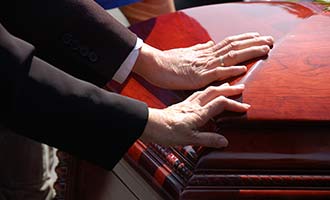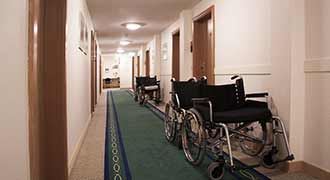
Nursing home abuse and neglect are unfortunately not uncommon occurrences in Massachusetts. You or your loved one may be entitled to compensation for medical bills and pain and suffering resulting from nursing home abuse or neglect. d’Oliveira & Associates works with experienced nursing home abuse and neglect lawyers across the country to handle these types of cases. There is no cost to you unless you receive an award or settlement. For a free, no-obligation case evaluation, call us anytime at 1(508)-625-9765 or fill out an online contact form.
What Are the Most Common Types of Nursing Home Abuse Cases in MA?
- Injuries from Falls
- Mental & Emotional Abuse
- Infections
- Bed Sores & Pressure Sores
- Dehydration & Malnutrition
- Medication Errors
- Wrongful Death
Learn more about the types of abuse and neglect.
What Is a MA Nursing Home Abuse Case Worth?
Compensation for MA nursing home abuse or neglect cases is typically based on medical bills, pain and suffering, and other losses. Read more here.
Our Largest Nursing Home Abuse Settlements
- $450,000 for a man who sustained bedsores developed and pneumonia.
- $400,000 for a woman who was hospitalized for bedsores.
- $185,000 for a man who suffered a broken leg in a nursing home.
Nursing Home Wrongful Death Cases

Cases of prolonged or serious neglect in nursing homes may result in the wrongful death of nursing home residents. The most common circumstance surrounding wrongful death in nursing homes is staff failing to recognize or seek help for a resident’s medical issue, like a stroke or heart attack, before it is too late. Staff could also negligently fail to notice a resident’s infection, dehydration, or malnutrition for a long enough period that it results in the resident’s death. d’Oliveira & Associates works with knowledgeable MA nursing home abuse lawyers who are dedicated to fighting for those whose loved ones have died as a result of the abuse or neglect of a nursing home.
learn more about wrongful death lawsuits.
What Legal Rights Do Nursing Home Residents Have?
State and federal laws provide special protections for the rights of nursing home residents. The 1987 Nursing Home Reform Act requires that each state develop regulations specifically geared toward protecting nursing home residents’ rights.
Some of these rights include:
- Refuse medical treatment
- Privacy
- See visitors
- Choose one’s own doctor
- Freedom from restraints and sedation
- Request access to medical records
- Request information about the course of treatment
- Freedom from abuse
- Engage in social and physical activities
- File grievances
Upon request, nursing homes are required to provide a statement of residents’ rights. If a nursing home facility fails to comply with this policy or to recognize any of these rights, this may be grounds for nursing home abuse and filing suit against the abusive or neglectful nursing home.
Nursing Home Abuse Warning Signs and Types of Abuse
Some potential signs of nursing home abuse or neglect include:
- Weight loss from dehydration or malnutrition
- Poor hygiene
- Bruises, cuts, or marks that are unexplained
- Resident is fearful, anxious, or depressed
- Sores or bedsores
- Resident expresses concern about nursing home staff
How to Report Nursing Home Abuse & Neglect in Massachusetts
Elder abuse can be reported anytime online or by calling (800) 922-2275. It is advised that, upon seeing the above warning signs of nursing home abuse, you report the abuse as soon as possible to the Department of Public Health at (800) 462-5540, or call 911 if the situation is life-threatening or an emergency.
Massachusetts Nursing Home Abuse & Neglect Resources
Some helpful resources for MA nursing home abuse & neglect:
- Mass.gov report elder abuse and neglect
- Massachusetts Elder Abuse Hotline. The phone number is 800-922-2275.
- Call 911.
Federal Nursing Home Laws
The federal nursing home laws that currently govern include the Elder Justice Act, the Older Americans Act, and the Nursing Home Reform Act.
Massachusetts Nursing Home Law
In Massachusetts, elder abuse cases are investigated and monitored by the Executive Office of Elder Affairs (EOEA). Categorized under crimes against the elderly, elder abuse is defined under Massachusetts General Law c.19A, §14-26 as “acts or omissions resulting in serious physical, sexual or emotional injury or financial loss to an adult age 60 or older.” Massachusetts Patient Abuse Law MGL c.111, §§72F-72L “prohibit abuse, neglect, mistreatment and misappropriation in nursing homes and rest homes, and hospice and home health agencies.”
MA Nursing Homes that Have Paid the Most in Fines for Violations
In 2019, Attorney General Maura Healey imposed a settlement agreement for the severely negligent conduct of some Massachusetts nursing homes. The following nursing homes were each fined between $30,000 and $200,000 for the abuse and wrongful deaths of their residents.
- Woodbriar Health Center
- Park Avenue Health Center
- Oxford Rehabilitation & Health Care Center
- Beaumont Rehabilitation and Skilled Nursing Center
- Braemoor Health Center
- New England Health Center
- JGC Lifecare
How Long Do I Have to File a Nursing Home Abuse Lawsuit in MA?
In Massachusetts, the statute of limitations for filing suit against a nursing home is three years.
What Is the Difference Between Neglect and Medical Malpractice?
Medical negligence happens when a provider of medical care does not meet the standard of care for healthcare professionals. When a medical professional acts negligently and causes their patient to suffer an injury, this is medical malpractice. Contact us at (508) 876-3579 to learn more.
How Much Does It Cost to Hire a MA Nursing Home Abuse Attorney?
Nursing home abuse cases are typically handled on a contingency fee basis. This means that you do not pay your attorney unless they win or settle your case.
How Can You Avoid Nursing Home Abuse and Neglect?
It can be difficult to choose which nursing facility to trust to care for you or your loved one. Choosing a nursing home with good reviews and a positive reputation in your community is a good way to avoid an abusive environment. Also, be sure to refer to studies like this one to determine how MA nursing homes near you are rated and why. Reach out to your medical professionals, family, and friends for recommendations on reputable nursing facilities. It is also recommended that you take a guided tour of the nursing facility prior to moving in, and return unannounced later to see how residents are typically treated.
If possible, request the facility’s federal inspection report card to ensure they have committed no major violations and that they are complying with standards and regulations. If it is your loved one who is moving into a nursing facility, be sure to contact and visit them frequently and ensure that their environment remains safe and comfortable.
What Is Considered Nursing Home Neglect in Massachusetts?
Some of the most prevalent types of nursing home neglect include:
- Medical Neglect
- Neglect of Personal Hygiene
- Abandonment
- Social or Emotional Neglect
Potential effects of neglect:
- Medication errors
- Dehydration
- Malnourishment and weight loss
- Poor Hygiene
- Choking
- Infections
- Influenza and other viruses
Click HERE for a video from U.S. Department of Health and Human Services: Abuse in Nursing Homes
Red Flags to Look for in MA Nursing Home Abuse or Negligence:

Checking in on your loved one who lives in a nursing home, especially unannounced, is one of the best ways to ensure the safety of their environment. One red flag to watch out for is the facility delaying or refusing your visit with your loved one during normal visiting hours. This may be an indicator that there is a reason they do not yet want you to know your loved one’s condition. Also, be sure to make note of how much privacy staff members give you and your loved one during your visits.
Staff members who act secretively or who stay nearby during visits may indicate there was an incident they do not want your loved one to tell you about. Also, be sure to look at the cleanliness and condition of their living space; dirty bedding, poor hygiene, or dirty clothing could indicate that your loved one is not getting proper care and attention from facility staff. If your loved one’s physical or mental health is quickly declining, this may also be an indicator of neglect.
Contact the Law Offices of d’Oliveira & Associates

If you or your loved one were injured while under the care of a nursing home, assisted living, or elder care facility, it is worth contacting an attorney about the legal options you have. d’Oliveira & Associates works with experienced Massachusetts nursing home abuse and neglect lawyers who can file a lawsuit on your behalf. There is no fee unless you obtain an award or settlement. Contact us today at 1-(508) 252-8510, or submit an online contact form for a free (no obligation) case evaluation.
